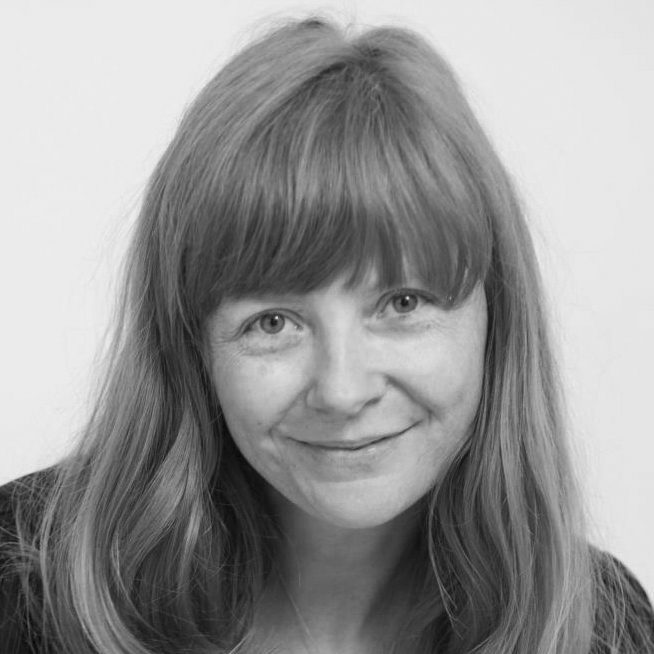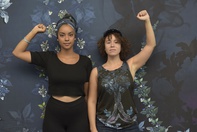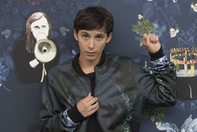Zanny Begg
in collaboration with Elise McLeod
Sydney
2017
Displayed 2017 at Museum of Contemporary Art Australia

Portrait of Zanny Begg
Zanny Begg
Born 1972, Melbourne. Lives and works Sydney
Zanny Begg is an artist and filmmaker interested in exploring the archaeology of contested history/ies and the architecture of social change. She works with film, drawing and installation to explore ways in which we can live and be in the world differently. This has included working with macro-political themes, such as alter-globalisation protests, and in micro-political worlds, such as with children in prison. Her work is often collaborative; in The City of Ladies she collaborated with the Paris-based Australian film director Elise McLeod, a childhood friend who Begg reconnected with through a shared interest in film and feminism.
Elise McLeod is a Paris based Australian film and theatre director who holds an honors degree in directing from the University of Paris VIII. She has directed several films, including Love, lies and the internet, Geisha and the award winning Fish & Chicks. She directed and adapted for theatre the famous French cartoon book The Rabbi’s cat by Joann Sfar. Her other theatre credits include Kiss DB ou L’histoire d’une mort sans fin, Revoir Amelie and Toutes Coupables. She has worked in the French film and television industry for over 15 years. The City of Ladies is her first collaboration with Zanny Begg.
Artist text
by Jiva Parthipan
Paris 1405
I feel changed all over. My arms feel stronger than before
The crying has stopped
My appearance has changed, strengthened. My voice is deeper
My body harder and more agile
The ring that Hymen gave me has slipped from my finger
This troubles me, as I loved it dearly. But then I stopped crying.
My new self was strong with a hardy spirit. I was astonished
I became a real man (1)
Weighted by the gender inequality of the time, Christine de Pizan, an Italian migrant in France and arguably the mother of present-day western feminism, imagines a didactic feminist utopia in Paris. The Book of the City of Ladies describes a cataclysmic time in France, caught in much political and social unrest.
Paris 2017
Zanny Begg’s new film collaboration with Paris-based film director Elise McLeod, The City of Ladies (2017), is influenced by Pizan’s seminal text and deals with parallel narratives. Centuries later, it seems that not much has changed for Parisian women. Paris is a contested city problemetised by class, arrondissements, race, religion and gender. Here, seven films are imagined by young French women from various ethnicities, including Cambodian, Algerian and Tunisian, to create a utopic dystopian dreamlike filmic fiction informed by their personal lives. Each screening of The City of Ladies will be generated randomly in a different order by software programmer Andrew Nicholson, offering variant perspectives.
Sydney 2017
Begg is an arch manipulator of negotiating multiple contexts, histories and narratives through the medium of film. Her 2015 film 1001 Nights in Fairfield reconfigures the West Asian folktale for the Western Sydney suburb of Fairfield via an Iraqi choir, charting migration and creating home in a surreal film shot through a stunning blue lens.
The City of Ladies contains choreography of gestures from the Nuit Debout political movement set to the song ‘Who Loves the Devil’, which was performed during the Bataclan theatre massacre in 2015 in Paris. This version, covered by the Sydney post-punk band Mere Women, proposes new engagements with the lyrics. Another storyline charts a French Muslim woman’s life as seen through the prism of Joan of Arc’s appropriation by the far right and the triumphant French feminism informed by empire, as personified by the burqa ban.
But what’s in the film for a man living in Sydney in 2017 with multiple roots in the UK and Sri Lanka?
I am not a woman. I am a male feminist.
‘A male intruder in the hive’ reads a review from a major British newspaper that references my early career as the first male dancer in an all-female contemporary dance company informed by classical Indian dance. While it’s important to let the aggrieved persons define racism, nationalism and sexism, any real change is only possible when it engages the other. The strength of Begg’s film is defined by its invitation for men, women and all genders in-between and beyond to reimagine 21st-century Paris in terms of how we perceive belonging in a world undergoing such transformation – no different to 14th-century France.
After all, we are in it together.
Note
(1) Christine de Pizan quoted in The vision of Chritine Pizan, trans. Glenda McLeod and Charity Cannon Willard, D.S. Brewer, Cambridge, UK, 2005.
Zanny Begg
4min
City of Ladies was directed by Zanny Begg and Elise McLeod



